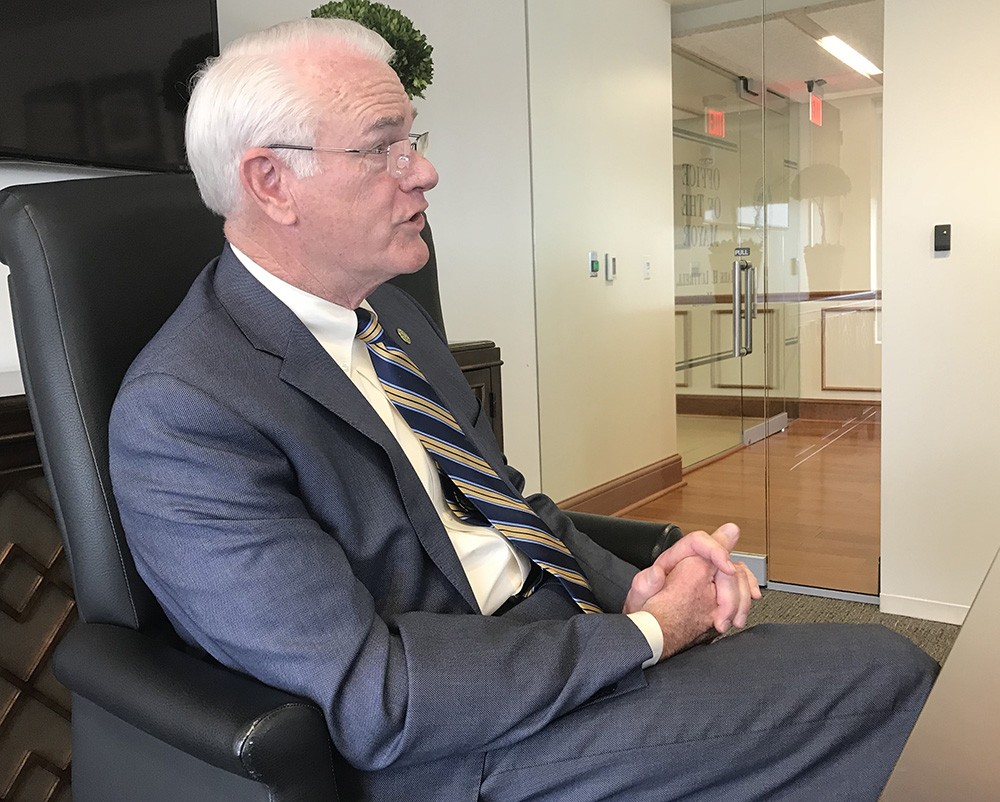 JB
JB
Luttrell at press conference
The Shelby County Commission, meeting in committee on Wednesday, will have the next move in a mounting confrontation between branches of government over the right legal strategy for confronting the opioid-addiction crisis in the county and the even more compelling and decisive matter of who has the legal authority to pursue that strategy.
Commission chair Heidi Shafer, accompanied by several supportive Commissioners, threw down the gauntlet last Thursday at a press conference at which she announced that, acting on her authority as chairman, she had engaged the law firm of Napoli Shkolnick to pursue a damage complaint on behalf of the county against a lengthy list of defendants, including drug manufacturers, pharmacists, and physicians.
County Mayor Mark Luttrell, who had denounced that action as a usurpation of authority last week, professed himserlf “irked” on Tuesday at a press conference of his own and followed through with an announcement that he was filing suit in Chancery Court for an injunction and restraining order against Shafer’s in presuming to execute such a contract.. Luttrell’s suit was also filed on behalf of the County and in the name of “Shelby County, Tennessee” as plaintiff.
Although the basic premise of Luttrell’s suit was that, according to the clear language of the county charter, Shafer’s action was “ultra vires” (Latin legalese for “beyond the powers” of her office), his motion for relief, listed several other alleged shortcomings, notably including the fact that, until the full Commission takes up a resolution of support for Shafer on Wednesday, it will not have formally conferred any statement of support for her.
Shafer had previously expressed confidence that she would have the backing of a clear Commission majority — one numerous enough both to pass a resolution of support and to supply the 8 votes from the 13-member body that would be necessary to override a potential mayoral veto of that resolution.
But, regardless of parliamentary outcomes, the fundamental issues of this latest confrontation between mayoral and Commission authority will apparently be resolved judicially.
In taking her action, Shafer alleged, among other things, that the administration had failed to act “expeditiously” on an issue that the state, by filing for remedies of its own in the opioid-addition matter, could co-opt the County ‘s freedom of action, a prospect that required her “to exercise the limited executive function that the charter allows me to employ special counsel to carry out our legislative initiatives.”
Among the other problems with Shafer’s action alleged by Luttrell in his suit and at his press conference are that Shafer’s brief fails to list specific damages for which relief is sought, that it binds the County to an arbitration process “limiting the legal remedies of the County,” and that it falsely alleges dilatory action on the administration’s part.
But the essential issue in Luttrell’s suit is that Shafer, whether or not she is able to secure a satisfactory statement of support from her Commission mates, is in violation of the County Charter, which grants “sole authority to contract on behalf of the County” and has thereby “usurped the authority endowed to the Mayor and the County Attorney” by the charter.
That is the matter that the courts will have to decide, and whatever resolution might come via judicial means will resolve not only the current imbroglio but a long-festering power struggle between the executive and legislative branches of Shelby County government.
That struggle first arose in the budget process of 2015 through Commissioners’ complaints that the administration had misleadingly withheld the true fact of a County fiscal surplus, thereby short-circuiting potential fiscal strategies — for a tax cut desired by some Commissioners, for spending programs desired by others. The disagreement has mounted in the two years since, aa the Commission has progressively demanded greater access to and control over financial and other matters.
One symbolic manifestation of the dispute was the Commission’s endeavor to have former Commissioner Julian Bolton hired as the Commission’s own independent attorney. The administration objected that only the County Attorney, appointed by the Mayor, could function as counsel for both administration and Commission, but consented to a compromise that Bolton could serve as a “policy advisor” to the Commission.
As it happens, though, Bolton is engaged as an attorney of record, along with Napoli Shkolnick, for legal action on behalf of the County in the contract executed by Shafer.